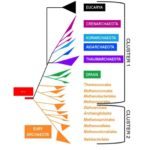Link to Pubmed [PMID] – 27189979
Link to HAL – pasteur-02445396
Link to DOI – 10.1093/gbe/evw114
Genome Biology and Evolution, 2016, 8 (6), pp.1706-1711. ⟨10.1093/gbe/evw114⟩
Methanogenesis coupled to the Wood-Ljungdahl pathway is one of the most ancient metabolisms for energy generation and carbon fixation in the Archaea. Recent results are sensibly changing our view on the diversity of methane-cycling capabilities in this Domain of Life. The availability of genomic sequences from uncharted branches of the archaeal tree has highlighted the existence of novel methanogenic lineages phylogenetically distant to previously known ones, such as the Methanomassiliicoccales. At the same time, phylogenomic analyses have suggested a methanogenic ancestor for all Archaea, implying multiple independent losses of this metabolism during archaeal diversification. This prediction has been strengthened by the report of genes involved in methane cycling in members of the Bathyarchaeota (a lineage belonging to the TACK clade), representing the first indication of the presence of methanogenesis outside of the Euryarchaeota. In light of these new data, we discuss how the association between methanogenesis and the Wood-Ljungdahl pathway appears to be much more flexible than previously thought, and might provide information on the processes that led to loss of this metabolism in many archaeal lineages. The combination of environmental microbiology, experimental characterization and phylogenomics opens up exciting avenues of research to unravel the diversity and evolutionary history of fundamental metabolic pathways.



